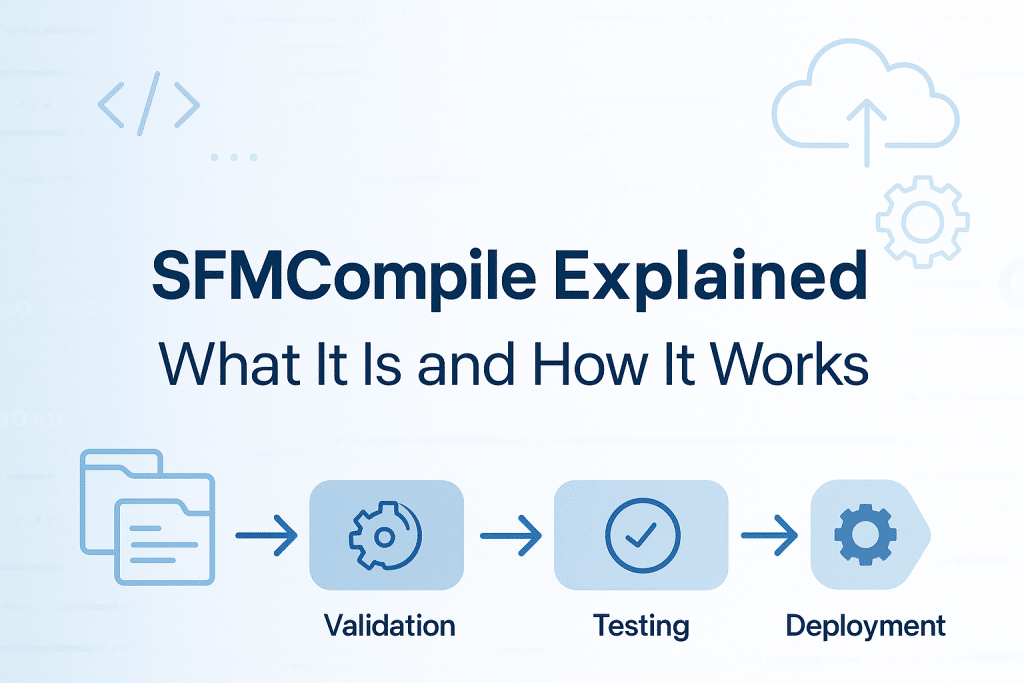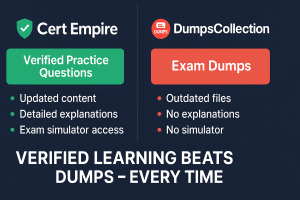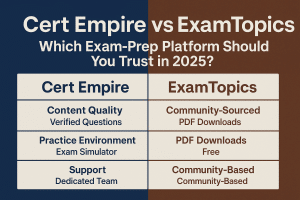TL;DR – SFMCompile Explained
SFMCompile is a specialized tool for automating the collection, validation, packaging, and deployment of Salesforce metadata. It’s designed to reduce manual errors, accelerate release cycles, and support modern DevOps practices in cloud environments. Teams use SFMCompile to streamline Salesforce development, ensure consistent deployments, and scale their CI/CD pipelines. The result is faster, more reliable updates and a smoother release process for both developers and admins.
Introduction: Why SFMCompile Matters in 2025
In today’s fast-paced world of cloud computing and agile software delivery, automation is not just an advantage, it’s a necessity. As platforms like Salesforce become more integral to business processes, companies face an ever-growing challenge: how to move changes quickly, reliably, and securely between environments.
Enter SFMCompile.
This tool, designed for automating the compilation and deployment of metadata (especially in Salesforce), is rapidly becoming a staple for DevOps teams and system admins. But what makes SFMCompile unique? How does it fit into the broader DevOps ecosystem? And most importantly, how can you use it to improve your deployment speed and reliability in 2025?
If you’re working with Salesforce and want to deepen your platform knowledge, using up-to-date Salesforce certification practice questions can accelerate your learning and help you understand the real-world impact of tools like SFMCompile.
What is SFMCompile?
SFMCompile stands for Salesforce Metadata Compile (sometimes called “Salesforce Metadata Compiler” in technical docs). It’s a tool or process that automates the collection, validation, and packaging of Salesforce metadata, from custom objects and fields to flows, triggers, and automation rules.
Why does this matter?
If you’ve ever migrated changes between Salesforce sandboxes or tried to manage large-scale org customizations, you know how time-consuming and risky manual processes can be. SFMCompile reduces that friction, giving you a smarter, faster, and more error-resistant way to manage Salesforce deployments.
The Rise of Automated Metadata Compilation
Historically, Salesforce admins and developers had to:
- Manually export and import metadata via the Salesforce UI or command-line tools,
- Track dependencies and manage changes across multiple files,
- Test deployments by hand, often facing surprise failures and rollbacks.
Manual methods were slow, error-prone, and didn’t scale.
As companies pushed for faster releases, especially with the adoption of agile and DevOps, the need for automation became urgent. Tools like SFMCompile were born out of this need, empowering teams to automate what was previously manual, tedious, and risky.
How SFMCompile Fits in Modern DevOps
SFMCompile is more than just a script, it’s a key link in the DevOps toolchain for Salesforce projects.
Where does it fit?
- Source Control: Integrates with Git, Bitbucket, or other version control systems.
- Continuous Integration (CI): Automatically compiles metadata after every code commit.
- Continuous Deployment (CD): Packages and pushes validated changes to QA, staging, or production.
- Automated Testing: Works alongside unit and integration tests, reducing human intervention.
If you’re building a cloud skillset beyond Salesforce, don’t miss our regularly updated latest Microsoft Azure dumps, perfect for expanding your DevOps knowledge into the Microsoft ecosystem.
Key Features of SFMCompile
| Feature | Description |
| Metadata Collection | Gathers all Salesforce metadata from source repositories or orgs |
| Dependency Validation | Checks for missing or conflicting components before deployment |
| Automated Compilation | Packages validated metadata into deployable units (e.g., zipped XML files) |
| Error Reporting | Provides detailed logs and error messages to speed up troubleshooting |
| Integration Support | Works with CI/CD tools like Jenkins, Azure DevOps, GitHub Actions, etc. |
| Rollback Capability | Enables easy reversal of deployments if errors are detected |
| Scalability | Handles projects ranging from small orgs to large enterprise deployments |
How SFMCompile Works: Step-by-Step
1. Metadata Collection
SFMCompile first gathers all relevant metadata from your Salesforce org or version control repository. This can include:
- Custom objects, fields, and relationships
- Apex classes and triggers
- Page layouts, flows, automation rules
- Permission sets and profiles
2. Validation
Next, SFMCompile checks for:
- Missing dependencies: Ensures all referenced components are included.
- Conflicts: Flags naming collisions or incompatible customizations.
- Version mismatches: Checks for compatibility with target org or Salesforce release.
3. Compilation
Validated metadata is packaged into a deployable format. Usually, this means zipped XML files or structured folders that Salesforce’s Metadata API can consume.
4. Deployment
The compiled package is deployed to the target environment (sandbox, UAT, production), either manually or via an automated pipeline.
5. Error Handling
If any errors occur, SFMCompile logs them, halts the process, and notifies the relevant team members for fast resolution.
SFMCompile Workflow
| Step | Description | Key Output |
| Metadata Collection | Gathers all components from source org or repo | Metadata inventory |
| Validation | Checks dependencies, conflicts, and version compatibility | Validation report |
| Compilation | Packages validated metadata into deployable files | Deployable package (zip) |
| Deployment | Pushes compiled package to target org/environment | Deployment status/logs |
| Error Handling | Reports any issues or failures with detailed context | Error reports/alerts |
SFMCompile Workflow: Visual Guide
Real-World Use Cases for SFMCompile
Case Study 1: Rapid Release Management
A fintech company needed to deliver new Salesforce features weekly. Manual metadata handling was slowing them down, leading to frequent deployment errors. After integrating SFMCompile with their CI/CD pipeline, deployment times dropped by 60%, and error rates fell dramatically.
Case Study 2: Large-Scale Data Migration
A global retail organization was merging multiple Salesforce orgs post-acquisition. With SFMCompile, their DevOps team was able to automate the validation and compilation of thousands of custom components—ensuring nothing got left behind during migration.
Case Study 3: Consultancy Scaling
A consulting firm supporting dozens of clients used SFMCompile to automate and standardize Salesforce deployments across multiple projects. This helped junior admins deliver faster, error-free updates.
Benefits for Developers, Admins, and Businesses
For Developers
- Spend less time on manual deployments
- Focus on building features, not fixing deployment errors
For Admins
- Reduce stress and human error during org updates
- Roll back changes easily if something goes wrong
For Businesses
- Faster delivery of new features and bug fixes
- Greater confidence in release quality and compliance
- Reduced downtime and disruption
Admins and DevOps professionals looking for cross-platform skills can also benefit from our trusted CompTIA certification resources, offering comprehensive study materials to complement your Salesforce expertise.
SFMCompile Benefits by Role
| Role | Key Benefit |
| Developer | Automates deployments, saves time |
| Admin | Reduces risk, improves reliability |
| Manager | Shortens release cycles, increases productivity |
| Business | Faster time to market, stronger compliance |
SFMCompile vs. Manual Metadata Management
| Factor | SFMCompile | Manual Process |
| Speed | Fast, automated | Slow, manual |
| Error Rate | Low (pre-deployment validation) | High (prone to human mistakes) |
| Scalability | Handles large projects seamlessly | Struggles with complex deployments |
| Rollback Capability | Built-in, easy | Difficult, often risky |
| Learning Curve | Steep at first, but easy to scale | Simple, but time-consuming to maintain |
| Integration | Works with modern DevOps pipelines | Limited, mostly stand-alone |
SFMCompile in CI/CD Pipelines
Continuous Integration and Continuous Deployment (CI/CD) are core DevOps practices. SFMCompile fits seamlessly into these pipelines, enabling:
- Automated testing: Compile and validate changes after each code commit.
- Automated deployment: Move packages to QA, staging, or production environments with no manual steps.
- Quality gates: Stop problematic deployments before they reach production.
Popular CI/CD Integrations:
- Jenkins
- GitHub Actions
- Azure DevOps
- Bitbucket Pipelines
For readers new to DevOps and continuous deployment, Salesforce’s official DevOps Center documentation offers practical insight into release management best practices and integrating automation tools like SFMCompile.
Troubleshooting and Best Practices
Common SFMCompile Issues
| Issue | Solution |
| Missing Dependencies | Check validation logs, include all components |
| Metadata API Version Mismatch | Update SFMCompile settings to match target |
| Deployment Failures | Review error reports, fix issues before retry |
| Rollback Problems | Use built-in rollback features, test first |
Best Practices
- Keep source control organized: Structure your repo to match Salesforce metadata types.
- Validate early and often: Catch errors before deployment by validating in development.
- Document custom components: Make sure your team knows what’s included and why.
- Automate testing: Integrate SFMCompile with your test suite for smoother releases.
Frequently Asked Questions (FAQs)
What is SFMCompile, in simple terms?
SFMCompile is a tool that automates the collection, validation, and deployment of Salesforce metadata—making releases faster and more reliable.
Who should use SFMCompile?
Any team working with Salesforce metadata—developers, admins, release managers, DevOps teams, and consultants.
Is SFMCompile only for Salesforce?
It is designed specifically for Salesforce, but similar approaches exist for other cloud platforms.
How does SFMCompile help with compliance?
It automates deployment logs and validation, supporting audit trails and regulatory requirements.
Can SFMCompile rollback changes?
Yes, most versions of SFMCompile have built-in rollback features.
Is there support or a user community for SFMCompile?
Many DevOps forums, Salesforce user groups, and technical documentation sites provide support, tips, and updates for SFMCompile users.
Conclusion & Further Resources
SFMCompile is transforming how Salesforce admins and developers manage metadata. By automating tedious, error-prone processes, it enables faster releases, higher reliability, and greater peace of mind for both technical teams and business stakeholders.
As DevOps practices evolve, mastering tools like SFMCompile will only become more important. Whether you’re migrating to Salesforce, scaling your app, or managing complex projects, learning how SFMCompile works can give your team a lasting advantage.
Want to boost your Salesforce skills or automate your deployments even further? Explore IT exam dumps and study resources and training options, and consider joining the Salesforce Trailblazer Community for hands-on advice.
Written and reviewed by Aidan Cortes, Salesforce DevOps Specialist at Cert Empire.
Last Updated on by Team CE



























